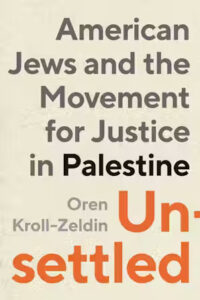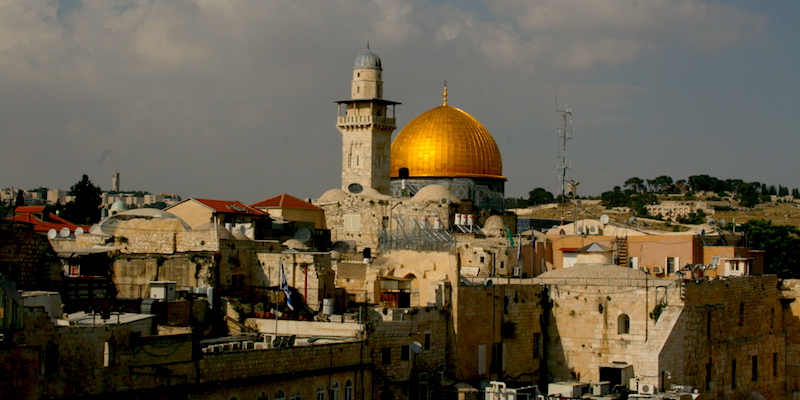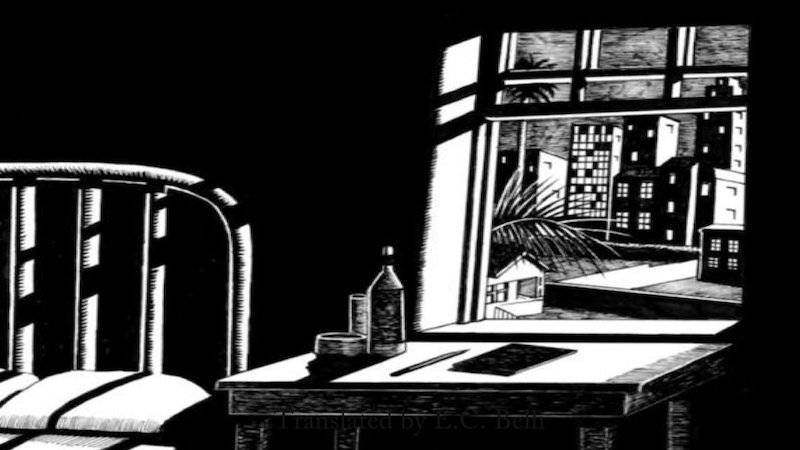What Unlearning Zionism Can Teach American Jews About Israel and Palestine
Oren Kroll-Zeldin on Jewish Identity, Community Myths and Personal and Political Transformation
For most, myself included, unlearning Zionism is a long and arduous process. But along the way there are moments that form cracks in the foundations of dominant Jewish communal narratives, thereby acting as a rupture with the past. The more people uncover the myths of Zionism, the larger the cracks grow, until the foundation itself crumbles.
One of the most significant moments that began chipping away at the Israel education of my youth occurred when I staffed a Taglit-Birthright Israel trip in July 2006. Prior to starting graduate school, I worked at Berkeley Hillel, where one of my responsibilities was to recruit for and lead the Hillel Birthright trip for UC Berkeley students. Between 2005 and 2007 I led three Birthright trips, including one particularly fateful trip in July 2006.
The sheer inability to see or recognize the human suffering on the other side of the border was deeply troubling to me and was a point of rupture.The bus I was on that summer happened to be Hillel’s only Birthright trip in Israel at the time, and we were in the northern Galilee close to the Lebanese border on July 12 when the 2006 war between Israel and Hezbollah broke out. Kayaking down the Jordan River, hiking in the mountains in the Golan Heights, and learning about the modern political history of Israel (all routine elements of a Birthright trip) made us feel far away from the escalation of violence. For the first few days of the trip, we went about our planned itinerary with little distraction. But the feeling of distance did not last long.
Shortly after the war began, our group ate dinner on the terrace outside of our hotel in Tiberius, overlooking the Sea of Galilee with the mystical city of Safed on the opposite hillside. Earlier in the day, we had seen plumes of smoke rising in the distance, a perpetual reminder of the falling rockets and escalating violence between Israel and Hezbollah. At night we witnessed the night sky light up with missile fire.
The next day, a Saturday, our group ate lunch together in the hotel. We had just sat down to have a Sabbath meal when we heard a deafening noise that shook the building. Some students stood up, looking around with terror. Thirty seconds later, we heard another sound, similar to the first, this one seemingly closer. It was even louder, causing the building to shake even harder. More students got up and started to shriek and run out of the room. An additional thirty seconds passed and there was a third and final boom, even louder and stronger than the first two. This propelled the majority of the people in the hotel into a state of panic.
Three Katyusha rockets fired by Hezbollah, from southern Lebanon, had landed within three hundred meters of our hotel. Everyone, the Jewish American students I was leading and the Jewish Israeli citizens enjoying the day in the hotel in order to escape the fighting farther north, ran frantically to the closest bomb shelters. Our group spent six hours in the hotel’s bomb shelter, waiting for clearance until it was safe to leave. Though we communicated with Birthright and the tour operators consistently, they assured us that we were safe and could continue with our itinerary. They told us that there was no need to abandon our tour and relocate to the center of the country, where we would be out of the rockets’ reach.
Even today, I don’t fault the tour organizers or Birthright for failing to recognize the danger that we were in by being so close to the fighting. But what I began realizing that day was an issue much larger and more systemic than Birthright specifically or Israel education generally. Immediately, the demonization of “the other” ramped up. Whether it was referring to Hezbollah specifically or Muslims generally, including Palestinian Muslims, a hateful rhetoric spoken by those around me emerged. Never once did anyone mention the larger historical context that led to the renewed fighting between Israel and Hezbollah.
For example, one of the Birthright staffers who met up with our trip told us that “Arabs hate Jews and want to destroy Israel.” Therefore, she said, Hezbollah must be defeated. Otherwise, they will “throw the Jews into the sea.” This justification of a brutally destructive and catastrophic war struck me at the time as being both deeply racist and totally myopic. The sheer inability to see or recognize the human suffering on the other side of the border was deeply troubling to me and was a point of rupture in my process of personal transformation.
Years later, I had a Lebanese student who told me that she was living in Beirut during the 2006 war. She shared that her family was traumatically impacted. She had relatives who died and other family members who had to flee their homes, even needing to leave the country, separating themselves from their loved ones and their community. She told me about her fear that the Israeli military could level her family’s house or her school at any time. It was a traumatic summer for her, and the impacts of the trauma are long-lasting.
The differences between my experience in Israel in the relative safety of the bomb shelter and that of my Lebanese student during the war are stark. We both had the experience of huddling in fear and hearing bombs drop around us. But the consequences for her and her family in Lebanon were far more severe than those for us on the Birthright trip. (For starters, we planned on leaving a few days later regardless of the war.) The lack of acknowledgment of these different experiences reveals a dramatic imbalance of power in Israel’s conflicts with its neighbors. It also makes evident the ways that Jewish educational institutions like Birthright do not engage with the entangled nature of the lives of Jews and the people in the countries adjacent to Israel.
During the Birthright trip that summer, no one talked about the experiences of Lebanese civilians or the possible impacts of war on a society that was rebuilding after a decades-long, violent civil war. Instead, Birthright and prominent Jewish leaders spewed pro-Israel propaganda at the staff and participants. The rhetoric appeared to me to be an attempt to capitalize on a recent trauma when telling participants that Israel truly was a “villa in the jungle.” “See,” they said. “Arabs and Muslims indeed hate Jews, and therefore Israel needs the support of diaspora Jews in order to survive.” After the trip, I began to see this process of invisibilization, demonization, and omission as routine. It required me to unlearn the Israeli and Jewish exceptionalism I was taught in my youth and that I so blatantly witnessed that summer.
Although I didn’t recognize it at the time, the failure of Birthright and mainstream Jewish organizations to criticize or even recognize Israel’s complicity in the outbreak of the 2006 war or its subsequent military incursions into Lebanon was a turning point for me in my political and personal journey toward transformation and unlearning. This was when I began questioning Israel. I asked those in my American Jewish community, why had the IDF acted so violently in Lebanon during that war?
Yet I found only a few people who spoke up about Israel’s role in the war. Even when they were so quick to condemn other acts of violence, those carried out by other governments, they didn’t do so in the context of Israel. My questions led to confusion: Why would supporters of Israel openly cheer at the violent destruction of cities and towns in Lebanon and be so pleased by the deaths of Lebanese civilians? What did Palestinian refugees living in Lebanon experience during the war?
Confusion led to anger and sadness. When I saw images of the impact of the war in Lebanon, I was so deeply angry that Jewish people could cause such destruction. I was sad that people I loved and trusted—my friends and family—condoned the violence that Israel caused, justifying it completely in the name of self-defense. How could the people who taught me to value peace and respect others tolerate such catastrophic killing and destruction?
The anger, confusion, and dissonance I experienced in July 2006 mirror the experience of countless other American Jews who were disillusioned by Israel’s wars in Gaza since that time. That summer also inspired me to explore Palestinian identity and narratives of conflict more seriously, which led me to a path of study and activist work that I continue to this day. Witnessing the utter lack of nuance and complete erasure of Palestinian narratives throughout my Jewish education was one of the things that led me to further examine my own understandings of Zionism and to seek out opportunities to learn Palestinian histories. I was taught (and believed) the myth that “there is no such thing as Palestinians.”
As part of my unlearning, I also traveled throughout the West Bank and saw firsthand the impacts of occupation and apartheid on everyday life for Palestinians. The word “occupation,” which was never once uttered in any educational setting in my youth, entered my lexicon, and I made a point of teaching my friends and family as much as I could about what I was learning. What at first felt like a betrayal of my family and my Jewishness, my process of personal transformation—from an unquestioning Zionist background to one committed to anti-occupation politics—actually helped me reassert an emancipatory Jewish identity based on justice for all people. What was most emancipatory for me was the ability to transcend the cognitive dissonance that Zionist politics required, which also helped me to understand that I could practice a Jewishness that had no relationship to an ethnonational Jewish state.
Unlearning is a commitment to doing the emotional and political labor necessary to work in solidarity with Palestinians in the struggle for justice.While I was taught that Zionism was about liberation for Jews, I was unaware that Jewish liberation in Israel was predicated on the oppression and ethnic cleansing of Palestinians. I was horrified when I understood the implementation of Zionist policies in Israel as a form of ethnonationalism and that Israel, as a Jewish state, requires a demographic majority of Jews at the direct expense of the Palestinian population. It was painful to view Israel through the lens of settler colonialism, in which Jews aim to eliminate both the Palestinians and their claims to the land.
The most personally painful and challenging element of learning about Palestine was feeling like I was betrayed by the community that educated me—my teachers, my camp counselors, and, most importantly, my family. They taught me to love and support Israel, but also to champion peace and justice and always act ethically. Learning about Palestine introduced a cognitive dissonance between my values and Israel’s actions that I could not reconcile and that introduced a painful feeling rooted in betrayal and sadness. At the time I felt a deep loss of something that was important to me, but I can now understand that the pain was the beginning of a process of realigning my beliefs and politics with the values that most mattered to me.
Integral to my process of unlearning Zionism was meeting and befriending Palestinians. I learned from them about their rich cultural and political identities, which further dispelled the myths of Zionism and Israel with which I was raised. My new Palestinian friends taught me that Palestinians are not monolithic, that they have numerous opinions, political orientations, and approaches to community organizing around their liberation. They showed me that Palestinians have a rich history that is deeply connected to the land and that there are families who have continuously practiced farming and herding for centuries.
When I participated in a Palestinian olive harvest in the northern West Bank in the fall of 2012, I saw firsthand how deep Palestinian connections are to the land, which mirrored the significant Jewish and Zionist connections to the land that I was taught as well. I also learned from Palestinians that they have a unique culture, one that is distinct from other Arabic-speaking peoples in the Middle East; they were Palestinian Arabs. Further, I learned about the nuances in regional cultures and dialects even among Palestinians.
The most painful thing I learned from Palestinians was that the fragmentation of their people, and Israel’s steadfast refusal to allow Palestinian refugees to return to the houses they fled in 1947–1949 or 1967, meant that many were never able to return home. Learning this further complicated the cognitive dissonance I experienced in my process of unlearning Zionism, when knowing full well that since I am Jewish I can travel to Israel or the West Bank any time I want. Moreover, my Jewishness enables me to become an Israeli citizen as a benefit of Israel’s Law of Return, all while Palestinians are systematically denied their right to return. Now, all of these things are glaringly obvious. But I needed to learn them, and unlearn other things, because I was raised with the myth that Palestinians did not exist.
To reiterate, my point in sharing part of my own process of unlearning Zionism and personal transformation is to show that what I experienced is very similar to what many of the activists involved in anti-occupation and anti-apartheid activism today learn. For many, unlearning Zionism is a critical step toward engaging in anti-occupation activism. As I describe below, through my scholarship and work as an educator I challenge the previously held views of my students and facilitate a reflective process that enables them to critically rethink and reimagine their connections to Israel. Unlearning is a commitment to doing the emotional and political labor necessary to work in solidarity with Palestinians in the struggle for justice.
In short, unlearning Zionism often manifests as a series of mobilizing moments, similar to those discussed in the previous chapter, that crystallize a moral critique of Zionism and solidify the process of becoming an active participant in the Palestine solidarity movement.
__________________________________

The following is excerpted from Unsettled: American Jews and the Movement for Justice in Palestine by Oren Kroll-Zeldin. Copyright © 2024. Available from NYU Press.




















